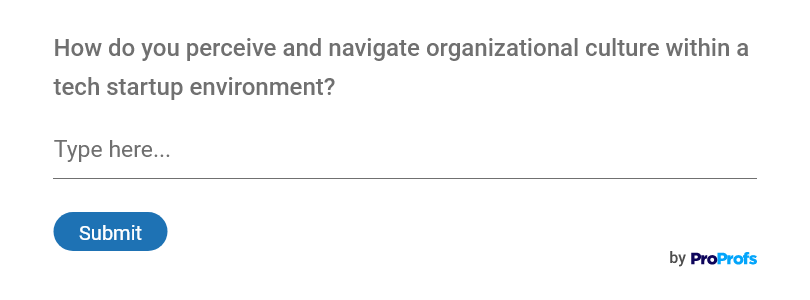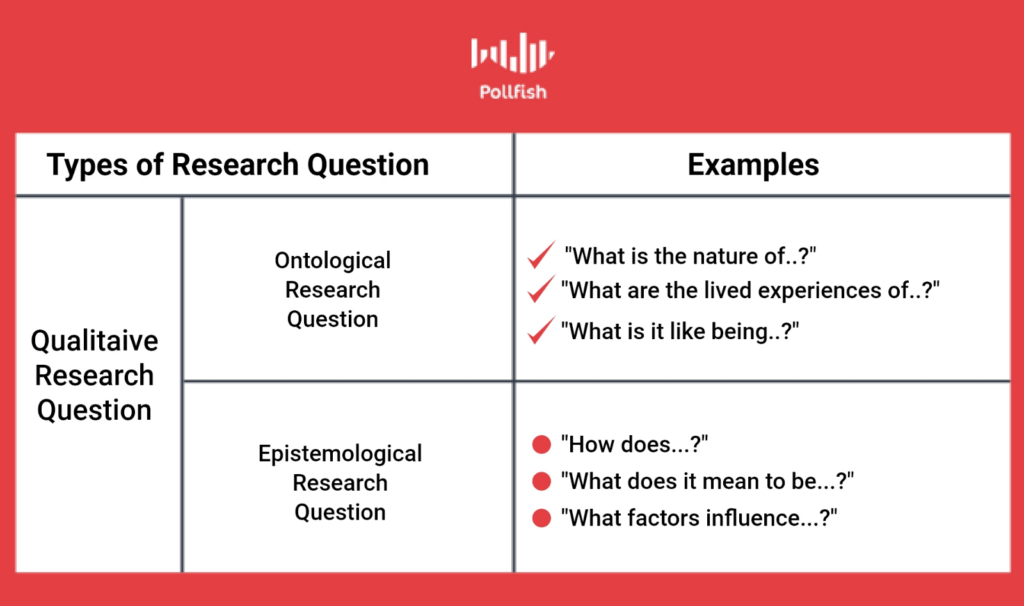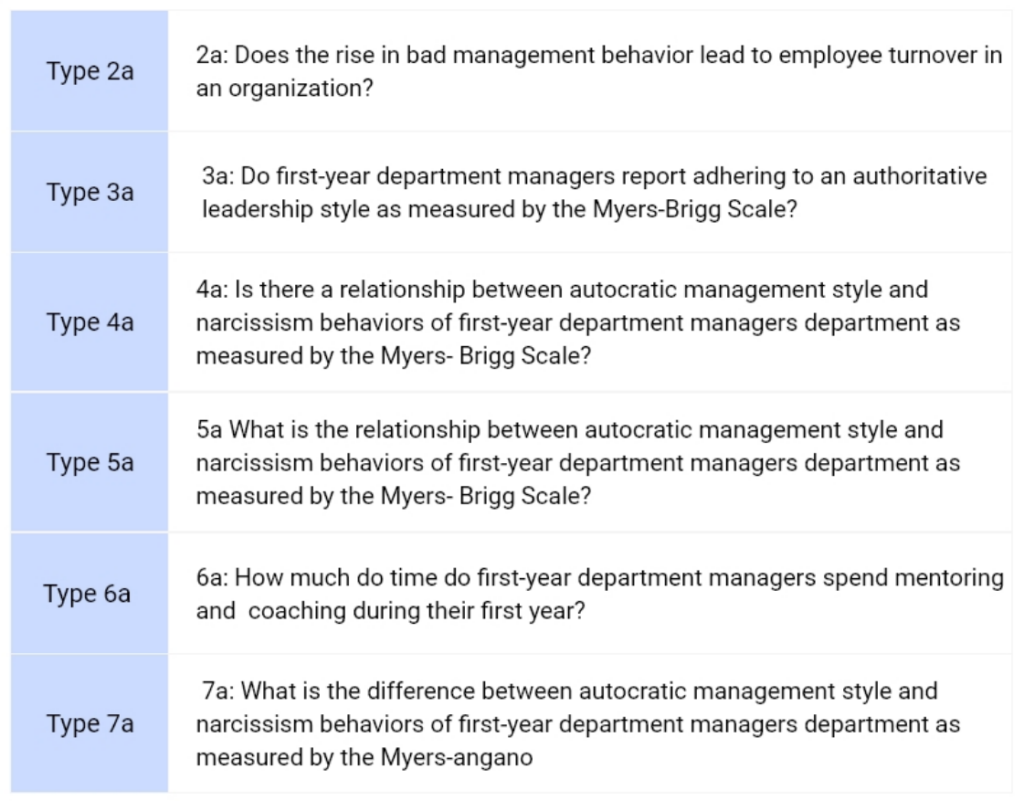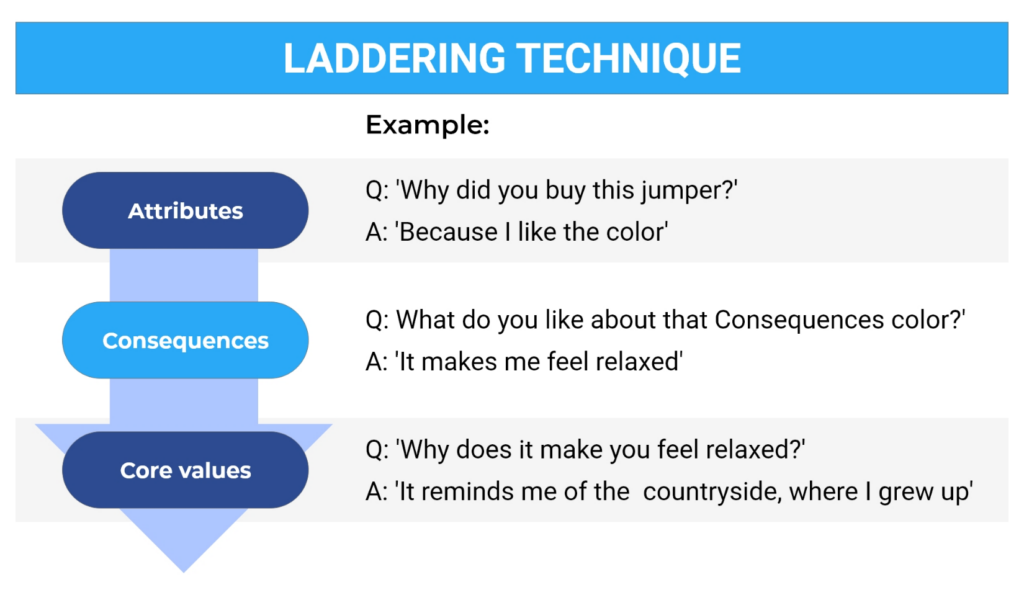- (855) 776-7763
Training Maker
All Products
Qualaroo Insights
ProProfs.com
- Get Started Free
FREE. All Features. FOREVER!
Try our Forever FREE account with all premium features!

How to Write Qualitative Research Questions: Types & Examples

Market Research Specialist
Emma David, a seasoned market research professional, specializes in employee engagement, survey administration, and data management. Her expertise in leveraging data for informed decisions has positively impacted several brands, enhancing their market position.

Qualitative research questions focus on depth and quality, exploring the “why and how” behind decisions, without relying on statistical tools.
Unlike quantitative research, which aims to collect tangible, measurable data from a broader demographic, qualitative analysis involves smaller, focused datasets, identifying patterns for insights.
The information collected by qualitative surveys can vary from text to images, demanding a deep understanding of the subject, and therefore, crafting precise qualitative research questions is crucial for success.
In this guide, we’ll discuss how to write effective qualitative research questions, explore various types, and highlight characteristics of good qualitative research questions.
Let’s dive in!
What Are Qualitative Research Questions?
Qualitative questions aim to understand the depth and nuances of a phenomenon, focusing on “why” and “how” rather than quantifiable measures.
They explore subjective experiences, perspectives, and behaviors, often using open-ended inquiries to gather rich, descriptive data.
Unlike quantitative questions, which seek numerical data, qualitative questions try to find out meanings, patterns, and underlying processes within a specific context.
These questions are essential for exploring complex issues, generating hypotheses, and gaining deeper insights into human behavior and phenomena.
Here’s an example of a qualitative research question:
“How do you perceive and navigate organizational culture within a tech startup environment?”

This question asks about the respondent’s subjective interpretations and experiences of organizational culture within a specific context, such as a tech startup.
It seeks to uncover insights into the values, norms, and practices that shape workplace dynamics and employee behaviors, providing qualitative data for analysis and understanding.
When Should We Use Qualitative Research Questions?
Qualitative research questions typically aim to open up conversations, encourage detailed narratives, and foster a deep understanding of the subject matter. Here are some scenarios they are best suited for:
- Exploring Complex Phenomena : When the research topic involves understanding complex processes, behaviors, or interactions that cannot be quantified easily, qualitative questions help delve into these intricate details.
- Understanding Contexts and Cultures : To grasp the nuances of different social contexts, cultures, or subcultures, qualitative research questions allow for an in-depth exploration of these environments and how they influence individuals and groups.
- Exploring Perceptions and Experiences : When the aim is to understand people’s perceptions, experiences, or feelings about a particular subject, qualitative questions facilitate capturing the depth and variety of these perspectives.
- Developing Concepts or Theories : In the early stages of research, where concepts or theories are not yet well-developed, qualitative questions can help generate hypotheses, identify variables, and develop theoretical frameworks based on observations and interpretations.
- Investigating Processes : To understand how processes unfold over time and the factors that influence these processes, qualitative questions are useful for capturing the dynamics and complexities involved.
- Seeking to Understand Change : When researching how individuals or groups experience change, adapt to new circumstances, or make decisions, qualitative research questions can provide insights into the motivations, challenges, and strategies involved.
- Studying Phenomena Not Easily Quantified : For phenomena that are not easily captured through quantitative measures, such as emotions, beliefs, or motivations, qualitative questions can probe these abstract concepts more effectively.
- Addressing Sensitive or Taboo Topics : In studies where topics may be sensitive, controversial, or taboo, qualitative research questions allow for a respectful and empathetic exploration of these subjects, providing space for participants to share their experiences in their own words.
How to Write Qualitative Research Questions?
Read this guide to learn how you can craft well-thought-out qualitative research questions:
1. Begin with Your Research Goals
The first step in formulating qualitative research questions is to have a clear understanding of what you aim to discover or understand through your research. There are two types of qualitative questionnaires or research – Ontological and Epistemological.
Finding out the nature of your research influences all aspects of your research design, including the formulation of research questions.
Subsequently:
- Identify your main objective : Consider the broader context of your study. Are you trying to explore a phenomenon, understand a process, or interpret the meanings behind behaviors? Your main objective should guide the formulation of your questions, ensuring they are aligned with what you seek to achieve.
- Focus on the ‘how’ and ‘why’ : Qualitative research is inherently exploratory and aims to understand the nuances of human behavior and experience. Starting your questions with “how” or “why” encourages a deeper investigation into the motivations, processes, and contexts underlying the subject matter. This approach facilitates an open-ended exploration, allowing participants to provide rich, detailed responses that illuminate their perspectives and experiences.
Take a quick look at the following visual for a better understanding:

So, if you are doing Ontological research, ensure that the questions focus on the “what” aspects of reality (the premise of your research) and opt for the nature of the knowledge for Epistemological research.
2. Choose the Right Structure
The structure of your research questions significantly impacts the depth and quality of data you collect. Opting for an open-ended format allows respondents the flexibility to express themselves freely, providing insights that pre-defined answers might miss.
- Open-ended format : These questions do not constrain respondents to a set of predetermined answers, unlike closed-ended questions. By allowing participants to articulate their thoughts in their own words, you can uncover nuances and complexities in their responses that might otherwise be overlooked.
- Avoid yes/no questions : Yes/no questions tend to limit the depth of responses. While they might be useful for gathering straightforward factual information, they are not conducive to exploring the depths and nuances that qualitative research seeks to uncover. Encouraging participants to elaborate on their experiences and perspectives leads to richer, more informative data.
For example, take a look at some qualitative questions examples shown in the following image:

3. Be Clear and Specific
Clarity and specificity in your questions are crucial to ensure that participants understand what is being asked and that their responses are relevant to your research objectives.
- Use clear language : Use straightforward, understandable language in your questions. Avoid jargon, acronyms, or overly technical terms that might confuse participants or lead to misinterpretation. The goal is to make your questions accessible to everyone involved in your study.
- Be specific : While maintaining the open-ended nature of qualitative questions, it’s important to narrow down your focus to specific aspects of the phenomenon you’re studying. This specificity helps guide participants’ responses and ensures that the data you collect directly relates to your research objectives.
4. Ensure Relevance and Feasibility
Each question should be carefully considered for its relevance to your research goals and its feasibility, given the constraints of your study.
- Relevance : Questions should be crafted to address the core objectives of your research directly. They should probe areas that are essential to understanding the phenomenon under investigation and should align with your theoretical framework or literature review findings.
- Feasibility : Consider the practical aspects of your research, including the time available for data collection and analysis, resources, and access to participants. Questions should be designed to elicit meaningful responses within the constraints of your study, ensuring that you can gather and analyze data effectively.
5. Focus on a Single Concept or Theme per Question
To ensure clarity and depth, each question should concentrate on a single idea or theme. However, if your main qualitative research question is tough to understand or has a complex structure, you can create sub-questions in limited numbers and with a “ladder structure”.
This will help your respondents understand the overall research objective in mind, and your research can be executed in a better manner.
For example, suppose your main question is – “What is the current state of illiteracy in your state?”
Then, you can create the following subquestions:
“How does illiteracy block progress in your state?”
“How would you best describe the feelings you have about illiteracy in your state?”
For an even better understanding, you can see the various qualitative research question examples in the following image:

💡 Tips for Refinement:
📊 Pilot your questions : Test them with a small group similar to your study population to ensure they are understood as intended and elicit the kind of responses you are seeking.
📝Be flexible : Be prepared to refine your questions based on pilot feedback or as your understanding of the topic deepens.
Types of Qualitative Research Questions With Examples
Qualitative survey questions primarily focus on a specific group of respondents that are participating in case studies, surveys, ethnography studies, etc., rather than numbers or statistics.
As a result, the questions are mostly open-ended and can be subdivided into the following types as discussed below:
1. Descriptive Questions
Descriptive research questions aim to detail the “what” of a phenomenon, providing a comprehensive overview of the context, individuals, or situations under study. These questions are foundational, helping to establish a baseline understanding of the research topic.
- What are the daily experiences of teachers in urban elementary schools?
- What strategies do small businesses employ to adapt to rapid technological changes?
- How do young adults describe their transition from college to the workforce?
- What are the coping mechanisms of families with members suffering from chronic illnesses?
- How do community leaders perceive the impact of gentrification in their neighborhoods?
2. Interpretive Questions
Interpretive questions seek to understand the “how” and “why” behind a phenomenon, focusing on the meanings people attach to their experiences. These questions delve into the subjective interpretations and perceptions of participants.
- How do survivors of natural disasters interpret their experiences of recovery and rebuilding?
- Why do individuals engage in voluntary work within their communities?
- How do parents interpret and navigate the challenges of remote schooling for their children?
- Why do consumers prefer local products over global brands in certain markets?
- How do artists interpret the influence of digital media on traditional art forms?
3. Comparative Questions
Comparative research questions are designed to explore differences and similarities between groups, settings, or time periods. These questions can help to highlight the impact of specific variables on the phenomenon under study.
- How do the strategies for managing work-life balance compare between remote and office workers?
- What are the differences in consumer behavior towards sustainable products in urban versus rural areas?
- How do parenting styles in single-parent households compare to those in dual-parent households?
- What are the similarities and differences in leadership styles across different cultures?
- How has the perception of online privacy changed among teenagers over the past decade?
4. Process-oriented Questions
These questions focus on understanding the processes or sequences of events over time. They aim to uncover the “how” of a phenomenon, tracing the development, changes, or evolution of specific situations or behaviors.
- How do non-profit organizations develop and implement community outreach programs?
- What is the process of decision-making in high-stakes business environments?
- How do individuals navigate the process of career transition after significant industry changes?
- What are the stages of adaptation for immigrants in a new country?
- How do social movements evolve from inception to national recognition?
5. Evaluative Questions
Evaluative questions aim to assess the effectiveness, value, or impact of a program, policy, or phenomenon. These questions are critical for understanding the outcomes and implications of various initiatives or situations.
- How effective are online therapy sessions compared to in-person sessions in treating anxiety?
- What is the impact of community gardening programs on neighborhood cohesion?
- How do participants evaluate the outcomes of leadership training programs in their professional development?
- What are the perceived benefits and drawbacks of telecommuting for employees and employers?
- How do residents evaluate the effectiveness of local government policies on waste management?
6. One-on-One Questions
The one-on-one questions are asked to a single person and can be thought of as individual interviews that you can conduct online via phone and video chat as well.
The main aim of such questions is to ask your customers or people in the focus group a series of questions about their purchase motivations. These questions might also come with follow-ups, and if your customers respond with some interesting fact or detail, dig deeper and explore the findings as much as you want.
- What makes you happy in regard to [your research topic]?
- If I could make a wish of yours come true, what do you desire the most?
- What do you still find hard to come to terms with?
- Have you bought [your product] before?
- If so, what was your initial motivation behind the purchase?
7. Exploratory Questions
These questions are designed to enhance your understanding of a particular topic. However, while asking exploratory questions, you must ensure that there are no preconceived notions or biases to it. The more transparent and bias-free your questions are, the better and fair results you will get.
- What is the effect of personal smart devices on today’s youth?
- Do you feel that smart devices have positively or negatively impacted you?
- How do your kids spend their weekends?
- What do you do on a typical weekend morning?
8. Predictive Questions
The predictive questions are used for qualitative research that is focused on the future outcomes of an action or a series of actions. So, you will be using past information to predict the reactions of respondents to hypothetical events that might or might not happen in the future.
These questions come in extremely handy for identifying your customers’ current brand expectations, pain points, and purchase motivation.
- Are you more likely to buy a product when a celebrity promotes it?
- Would you ever try a new product because one of your favorite celebs claims that it actually worked for them?
- Would people in your neighborhood enjoy a park with rides and exercise options?
- How often would you go to a park with your kids if it had free rides?
9. Focus Groups
These questions are mostly asked in person to the customer or respondent groups. The in-person nature of these surveys or studies ensures that the group members get a safe and comfortable environment to express their thoughts and feelings about your brand or services.
- How would you describe your ease of using our product?
- How well do you think you were able to do this task before you started using our product?
- What do you like about our promotional campaigns?
- How well do you think our ads convey the meaning?
10. In-Home Videos
Collecting video feedback from customers in their comfortable, natural settings offers a unique perspective. At home, customers are more relaxed and less concerned about their mannerisms, posture, and choice of words when responding.
This approach is partly why Vogue’s 73 Questions Series is highly popular among celebrities and viewers alike. In-home videos provide insights into customers in a relaxed environment, encouraging them to be honest and share genuine experiences.
- What was your first reaction when you used our product for the first time?
- How well do you think our product performed compared to your expectations?
- What was your worst experience with our product?
- What made you switch to our brand?
11. Online Focus Groups
Online focus groups mirror the traditional, in-person format but are conducted virtually, offering a more cost-effective and efficient approach to gathering data. This digital format extends your reach and allows a rapid collection of responses from a broader audience through online platforms.
You can utilize social media and other digital forums to create communities of respondents and initiate meaningful discussions. Once you have them started, you can simply observe the exchange of thoughts and gather massive amounts of interesting insights!
- What do you like best about our product?
- How familiar are you with this particular service or product we offer?
- What are your concerns with our product?
- What changes can we make to make our product better?
Ask the Right Qualitative Research Questions for Meaningful Insights From Your Respondents
Watch: How to Create a Survey Using ProProfs Survey Maker
By now, you might have realized that manually creating a list of qualitative research questions is a daunting task. Keeping numerous considerations in mind, it’s easy to run out of ideas while crafting qualitative survey questions .
However, investing in smart survey tools, like ProProfs Survey Maker, can significantly streamline this process, allowing you to create various types of surveys in minutes.
With this survey tools , you can generate forms, NPS survey , tests, quizzes, and assessments.
It’s also useful for conducting polls, sidebar surveys, and in-app surveys. Offering over 100 templates and more than 1,000,000 ready-to-use examples of phenomenological research questions, this software simplifies the task immensely.
Equipped with the right tools and the professional tips shared here, you’re well-prepared to conduct thorough research studies and obtain valuable insights that drive impactful results.
Frequently Asked Questions on Q ualitative Research Questions
1. how do you choose qualitative research questions.
To choose qualitative research questions, identify your main research goal, focus on exploring ‘how’ and ‘why’ aspects, ensure questions are open-ended, and align them with your theoretical framework and methodology.
2. Why are good qualitative research questions important?
Good qualitative research questions are important because they guide the research focus, enable the exploration of depth and complexity, and facilitate the gathering of rich, detailed insights into human experiences and behaviors.

About the author
Emma David is a seasoned market research professional with 8+ years of experience. Having kick-started her journey in research, she has developed rich expertise in employee engagement, survey creation and administration, and data management. Emma believes in the power of data to shape business performance positively. She continues to help brands and businesses make strategic decisions and improve their market standing through her understanding of research methodologies.
Related Posts

360 Feedback Questions: The Roadmap to Enhanced Employee Performance

How to Write Quantitative Research Questions: Types With Examples

20+ Best Software Survey Questions to Ask Your Customers in 2024

What Are Employee Pulse Surveys: A Detailed Guide with Examples + Tips

Product Market Fit: An Ultimate Guide

70+ Mental Health Survey Questionnaire for Students
Root out friction in every digital experience, super-charge conversion rates, and optimize digital self-service
Uncover insights from any interaction, deliver AI-powered agent coaching, and reduce cost to serve
Increase revenue and loyalty with real-time insights and recommendations delivered to teams on the ground
Know how your people feel and empower managers to improve employee engagement, productivity, and retention
Take action in the moments that matter most along the employee journey and drive bottom line growth
Whatever they’re saying, wherever they’re saying it, know exactly what’s going on with your people
Get faster, richer insights with qual and quant tools that make powerful market research available to everyone
Run concept tests, pricing studies, prototyping + more with fast, powerful studies designed by UX research experts
Track your brand performance 24/7 and act quickly to respond to opportunities and challenges in your market
Explore the platform powering Experience Management
- Free Account
- Product Demos
- For Digital
- For Customer Care
- For Human Resources
- For Researchers
- Financial Services
- All Industries
Popular Use Cases
- Customer Experience
- Employee Experience
- Net Promoter Score
- Voice of Customer
- Customer Success Hub
- Product Documentation
- Training & Certification
- XM Institute
- Popular Resources
- Customer Stories
- Artificial Intelligence
Market Research
- Partnerships
- Marketplace
The annual gathering of the experience leaders at the world’s iconic brands building breakthrough business results, live in Salt Lake City.
- English/AU & NZ
- Español/Europa
- Español/América Latina
- Português Brasileiro
- REQUEST DEMO
- Experience Management
- Qualitative Research
- Qualitative Research Questions
Try Qualtrics for free
How to write qualitative research questions.
11 min read Here’s how to write effective qualitative research questions for your projects, and why getting it right matters so much.
What is qualitative research?
Qualitative research is a blanket term covering a wide range of research methods and theoretical framing approaches. The unifying factor in all these types of qualitative study is that they deal with data that cannot be counted. Typically this means things like people’s stories, feelings, opinions and emotions , and the meanings they ascribe to their experiences.
Qualitative study is one of two main categories of research, the other being quantitative research. Quantitative research deals with numerical data – that which can be counted and quantified, and which is mostly concerned with trends and patterns in large-scale datasets.
What are research questions?
Research questions are questions you are trying to answer with your research. To put it another way, your research question is the reason for your study, and the beginning point for your research design. There is normally only one research question per study, although if your project is very complex, you may have multiple research questions that are closely linked to one central question.
A good qualitative research question sums up your research objective. It’s a way of expressing the central question of your research, identifying your particular topic and the central issue you are examining.
Research questions are quite different from survey questions, questions used in focus groups or interview questions. A long list of questions is used in these types of study, as opposed to one central question. Additionally, interview or survey questions are asked of participants, whereas research questions are only for the researcher to maintain a clear understanding of the research design.
Research questions are used in both qualitative and quantitative research , although what makes a good research question might vary between the two.
In fact, the type of research questions you are asking can help you decide whether you need to take a quantitative or qualitative approach to your research project.
Discover the fundamentals of qualitative research
Quantitative vs. qualitative research questions
Writing research questions is very important in both qualitative and quantitative research, but the research questions that perform best in the two types of studies are quite different.
Quantitative research questions
Quantitative research questions usually relate to quantities, similarities and differences.
It might reflect the researchers’ interest in determining whether relationships between variables exist, and if so whether they are statistically significant. Or it may focus on establishing differences between things through comparison, and using statistical analysis to determine whether those differences are meaningful or due to chance.
- How much? This kind of research question is one of the simplest. It focuses on quantifying something. For example:
How many Yoruba speakers are there in the state of Maine?
- What is the connection?
This type of quantitative research question examines how one variable affects another.
For example:
How does a low level of sunlight affect the mood scores (1-10) of Antarctic explorers during winter?
- What is the difference? Quantitative research questions in this category identify two categories and measure the difference between them using numerical data.
Do white cats stay cooler than tabby cats in hot weather?
If your research question fits into one of the above categories, you’re probably going to be doing a quantitative study.
Qualitative research questions
Qualitative research questions focus on exploring phenomena, meanings and experiences.
Unlike quantitative research, qualitative research isn’t about finding causal relationships between variables. So although qualitative research questions might touch on topics that involve one variable influencing another, or looking at the difference between things, finding and quantifying those relationships isn’t the primary objective.
In fact, you as a qualitative researcher might end up studying a very similar topic to your colleague who is doing a quantitative study, but your areas of focus will be quite different. Your research methods will also be different – they might include focus groups, ethnography studies, and other kinds of qualitative study.
A few example qualitative research questions:
- What is it like being an Antarctic explorer during winter?
- What are the experiences of Yoruba speakers in the USA?
- How do white cat owners describe their pets?
Qualitative research question types

Marshall and Rossman (1989) identified 4 qualitative research question types, each with its own typical research strategy and methods.
- Exploratory questions
Exploratory questions are used when relatively little is known about the research topic. The process researchers follow when pursuing exploratory questions might involve interviewing participants, holding focus groups, or diving deep with a case study.
- Explanatory questions
With explanatory questions, the research topic is approached with a view to understanding the causes that lie behind phenomena. However, unlike a quantitative project, the focus of explanatory questions is on qualitative analysis of multiple interconnected factors that have influenced a particular group or area, rather than a provable causal link between dependent and independent variables.
- Descriptive questions
As the name suggests, descriptive questions aim to document and record what is happening. In answering descriptive questions , researchers might interact directly with participants with surveys or interviews, as well as using observational studies and ethnography studies that collect data on how participants interact with their wider environment.
- Predictive questions
Predictive questions start from the phenomena of interest and investigate what ramifications it might have in the future. Answering predictive questions may involve looking back as well as forward, with content analysis, questionnaires and studies of non-verbal communication (kinesics).
Why are good qualitative research questions important?
We know research questions are very important. But what makes them so essential? (And is that question a qualitative or quantitative one?)
Getting your qualitative research questions right has a number of benefits.
- It defines your qualitative research project Qualitative research questions definitively nail down the research population, the thing you’re examining, and what the nature of your answer will be.This means you can explain your research project to other people both inside and outside your business or organization. That could be critical when it comes to securing funding for your project, recruiting participants and members of your research team, and ultimately for publishing your results. It can also help you assess right the ethical considerations for your population of study.
- It maintains focus Good qualitative research questions help researchers to stick to the area of focus as they carry out their research. Keeping the research question in mind will help them steer away from tangents during their research or while they are carrying out qualitative research interviews. This holds true whatever the qualitative methods are, whether it’s a focus group, survey, thematic analysis or other type of inquiry.That doesn’t mean the research project can’t morph and change during its execution – sometimes this is acceptable and even welcome – but having a research question helps demarcate the starting point for the research. It can be referred back to if the scope and focus of the project does change.
- It helps make sure your outcomes are achievable
Because qualitative research questions help determine the kind of results you’re going to get, it helps make sure those results are achievable. By formulating good qualitative research questions in advance, you can make sure the things you want to know and the way you’re going to investigate them are grounded in practical reality. Otherwise, you may be at risk of taking on a research project that can’t be satisfactorily completed.
Developing good qualitative research questions
All researchers use research questions to define their parameters, keep their study on track and maintain focus on the research topic. This is especially important with qualitative questions, where there may be exploratory or inductive methods in use that introduce researchers to new and interesting areas of inquiry. Here are some tips for writing good qualitative research questions.
1. Keep it specific
Broader research questions are difficult to act on. They may also be open to interpretation, or leave some parameters undefined.
Strong example: How do Baby Boomers in the USA feel about their gender identity?
Weak example: Do people feel different about gender now?
2. Be original
Look for research questions that haven’t been widely addressed by others already.
Strong example: What are the effects of video calling on women’s experiences of work?
Weak example: Are women given less respect than men at work?
3. Make it research-worthy
Don’t ask a question that can be answered with a ‘yes’ or ‘no’, or with a quick Google search.
Strong example: What do people like and dislike about living in a highly multi-lingual country?
Weak example: What languages are spoken in India?
4. Focus your question
Don’t roll multiple topics or questions into one. Qualitative data may involve multiple topics, but your qualitative questions should be focused.
Strong example: What is the experience of disabled children and their families when using social services?
Weak example: How can we improve social services for children affected by poverty and disability?
4. Focus on your own discipline, not someone else’s
Avoid asking questions that are for the politicians, police or others to address.
Strong example: What does it feel like to be the victim of a hate crime?
Weak example: How can hate crimes be prevented?
5. Ask something researchable
Big questions, questions about hypothetical events or questions that would require vastly more resources than you have access to are not useful starting points for qualitative studies. Qualitative words or subjective ideas that lack definition are also not helpful.
Strong example: How do perceptions of physical beauty vary between today’s youth and their parents’ generation?
Weak example: Which country has the most beautiful people in it?
Related resources
Qualitative research design 11 min read, primary vs secondary research 14 min read, business research methods 12 min read, mixed methods research 17 min read, market intelligence 10 min read, marketing insights 11 min read, ethnographic research 11 min read, request demo.
Ready to learn more about Qualtrics?
Qualitative Research Questions: Gain Powerful Insights + 25 Examples
We review the basics of qualitative research questions, including their key components, how to craft them effectively, & 25 example questions.
Einstein was many things—a physicist, a philosopher, and, undoubtedly, a mastermind. He also had an incredible way with words. His quote, "Everything that can be counted does not necessarily count; everything that counts cannot necessarily be counted," is particularly poignant when it comes to research.
Some inquiries call for a quantitative approach, for counting and measuring data in order to arrive at general conclusions. Other investigations, like qualitative research, rely on deep exploration and understanding of individual cases in order to develop a greater understanding of the whole. That’s what we’re going to focus on today.
Qualitative research questions focus on the "how" and "why" of things, rather than the "what". They ask about people's experiences and perceptions , and can be used to explore a wide range of topics.
The following article will discuss the basics of qualitative research questions, including their key components, and how to craft them effectively. You'll also find 25 examples of effective qualitative research questions you can use as inspiration for your own studies.
Let’s get started!

What are qualitative research questions, and when are they used?
When researchers set out to conduct a study on a certain topic, their research is chiefly directed by an overarching question . This question provides focus for the study and helps determine what kind of data will be collected.
By starting with a question, we gain parameters and objectives for our line of research. What are we studying? For what purpose? How will we know when we’ve achieved our goals?
Of course, some of these questions can be described as quantitative in nature. When a research question is quantitative, it usually seeks to measure or calculate something in a systematic way.
For example:
- How many people in our town use the library?
- What is the average income of families in our city?
- How much does the average person weigh?
Other research questions, however—and the ones we will be focusing on in this article—are qualitative in nature. Qualitative research questions are open-ended and seek to explore a given topic in-depth.
According to the Australian & New Zealand Journal of Psychiatry , “Qualitative research aims to address questions concerned with developing an understanding of the meaning and experience dimensions of humans’ lives and social worlds.”
This type of research can be used to gain a better understanding of people’s thoughts, feelings and experiences by “addressing questions beyond ‘what works’, towards ‘what works for whom when, how and why, and focusing on intervention improvement rather than accreditation,” states one paper in Neurological Research and Practice .
Qualitative questions often produce rich data that can help researchers develop hypotheses for further quantitative study.
- What are people’s thoughts on the new library?
- How does it feel to be a first-generation student at our school?
- How do people feel about the changes taking place in our town?
As stated by a paper in Human Reproduction , “...‘qualitative’ methods are used to answer questions about experience, meaning, and perspective, most often from the standpoint of the participant. These data are usually not amenable to counting or measuring.”
Both quantitative and qualitative questions have their uses; in fact, they often complement each other. A well-designed research study will include a mix of both types of questions in order to gain a fuller understanding of the topic at hand.
If you would like to recruit unlimited participants for qualitative research for free and only pay for the interview you conduct, try using Respondent today.
Crafting qualitative research questions for powerful insights
Now that we have a basic understanding of what qualitative research questions are and when they are used, let’s take a look at how you can begin crafting your own.
According to a study in the International Journal of Qualitative Studies in Education, there is a certain process researchers should follow when crafting their questions, which we’ll explore in more depth.
1. Beginning the process
Start with a point of interest or curiosity, and pose a draft question or ‘self-question’. What do you want to know about the topic at hand? What is your specific curiosity? You may find it helpful to begin by writing several questions.
For example, if you’re interested in understanding how your customer base feels about a recent change to your product, you might ask:
- What made you decide to try the new product?
- How do you feel about the change?
- What do you think of the new design/functionality?
- What benefits do you see in the change?
2. Create one overarching, guiding question
At this point, narrow down the draft questions into one specific question. “Sometimes, these broader research questions are not stated as questions, but rather as goals for the study.”
As an example of this, you might narrow down these three questions:
into the following question:
- What are our customers’ thoughts on the recent change to our product?
3. Theoretical framing
As you read the relevant literature and apply theory to your research, the question should be altered to achieve better outcomes. Experts agree that pursuing a qualitative line of inquiry should open up the possibility for questioning your original theories and altering the conceptual framework with which the research began.
If we continue with the current example, it’s possible you may uncover new data that informs your research and changes your question. For instance, you may discover that customers’ feelings about the change are not just a reaction to the change itself, but also to how it was implemented. In this case, your question would need to reflect this new information:
- How did customers react to the process of the change, as well as the change itself?
4. Ethical considerations
A study in the International Journal of Qualitative Studies in Education stresses that ethics are “a central issue when a researcher proposes to study the lives of others, especially marginalized populations.” Consider how your question or inquiry will affect the people it relates to—their lives and their safety. Shape your question to avoid physical, emotional, or mental upset for the focus group.
In analyzing your question from this perspective, if you feel that it may cause harm, you should consider changing the question or ending your research project. Perhaps you’ve discovered that your question encourages harmful or invasive questioning, in which case you should reformulate it.
5. Writing the question
The actual process of writing the question comes only after considering the above points. The purpose of crafting your research questions is to delve into what your study is specifically about” Remember that qualitative research questions are not trying to find the cause of an effect, but rather to explore the effect itself.
Your questions should be clear, concise, and understandable to those outside of your field. In addition, they should generate rich data. The questions you choose will also depend on the type of research you are conducting:
- If you’re doing a phenomenological study, your questions might be open-ended, in order to allow participants to share their experiences in their own words.
- If you’re doing a grounded-theory study, your questions might be focused on generating a list of categories or themes.
- If you’re doing ethnography, your questions might be about understanding the culture you’re studying.
Whenyou have well-written questions, it is much easier to develop your research design and collect data that accurately reflects your inquiry.
In writing your questions, it may help you to refer to this simple flowchart process for constructing questions:
Download Free E-Book
25 examples of expertly crafted qualitative research questions
It's easy enough to cover the theory of writing a qualitative research question, but sometimes it's best if you can see the process in practice. In this section, we'll list 25 examples of B2B and B2C-related qualitative questions.
Let's begin with five questions. We'll show you the question, explain why it's considered qualitative, and then give you an example of how it can be used in research.
1. What is the customer's perception of our company's brand?
Qualitative research questions are often open-ended and invite respondents to share their thoughts and feelings on a subject. This question is qualitative because it seeks customer feedback on the company's brand.
This question can be used in research to understand how customers feel about the company's branding, what they like and don't like about it, and whether they would recommend it to others.
2. Why do customers buy our product?
This question is also qualitative because it seeks to understand the customer's motivations for purchasing a product. It can be used in research to identify the reasons customers buy a certain product, what needs or desires the product fulfills for them, and how they feel about the purchase after using the product.
3. How do our customers interact with our products?
Again, this question is qualitative because it seeks to understand customer behavior. In this case, it can be used in research to see how customers use the product, how they interact with it, and what emotions or thoughts the product evokes in them.
4. What are our customers' biggest frustrations with our products?
By seeking to understand customer frustrations, this question is qualitative and can provide valuable insights. It can be used in research to help identify areas in which the company needs to make improvements with its products.
5. How do our customers feel about our customer service?
Rather than asking why customers like or dislike something, this question asks how they feel. This qualitative question can provide insights into customer satisfaction or dissatisfaction with a company.
This type of question can be used in research to understand what customers think of the company's customer service and whether they feel it meets their needs.
20 more examples to refer to when writing your question
Now that you’re aware of what makes certain questions qualitative, let's move into 20 more examples of qualitative research questions:
- How do your customers react when updates are made to your app interface?
- How do customers feel when they complete their purchase through your ecommerce site?
- What are your customers' main frustrations with your service?
- How do people feel about the quality of your products compared to those of your competitors?
- What motivates customers to refer their friends and family members to your product or service?
- What are the main benefits your customers receive from using your product or service?
- How do people feel when they finish a purchase on your website?
- What are the main motivations behind customer loyalty to your brand?
- How does your app make people feel emotionally?
- For younger generations using your app, how does it make them feel about themselves?
- What reputation do people associate with your brand?
- How inclusive do people find your app?
- In what ways are your customers' experiences unique to them?
- What are the main areas of improvement your customers would like to see in your product or service?
- How do people feel about their interactions with your tech team?
- What are the top five reasons people use your online marketplace?
- How does using your app make people feel in terms of connectedness?
- What emotions do people experience when they're using your product or service?
- Aside from the features of your product, what else about it attracts customers?
- How does your company culture make people feel?
As you can see, these kinds of questions are completely open-ended. In a way, they allow the research and discoveries made along the way to direct the research. The questions are merely a starting point from which to explore.
This video offers tips on how to write good qualitative research questions, produced by Qualitative Research Expert, Kimberly Baker.
Wrap-up: crafting your own qualitative research questions.
Over the course of this article, we've explored what qualitative research questions are, why they matter, and how they should be written. Hopefully you now have a clear understanding of how to craft your own.
Remember, qualitative research questions should always be designed to explore a certain experience or phenomena in-depth, in order to generate powerful insights. As you write your questions, be sure to keep the following in mind:
- Are you being inclusive of all relevant perspectives?
- Are your questions specific enough to generate clear answers?
- Will your questions allow for an in-depth exploration of the topic at hand?
- Do the questions reflect your research goals and objectives?
If you can answer "yes" to all of the questions above, and you've followed the tips for writing qualitative research questions we shared in this article, then you're well on your way to crafting powerful queries that will yield valuable insights.
Download Free E-Book
.png?width=2500&name=Respondent_100+Questions_Banners_1200x644%20(1).png)
Asking the right questions in the right way is the key to research success. That’s true for not just the discussion guide but for every step of a research project. Following are 100+ questions that will take you from defining your research objective through screening and participant discussions.
Fill out the form below to access free e-book!
Recommend Resources:
- How to Recruit Participants for Qualitative Research
- The Best UX Research Tools of 2022
- 10 Smart Tips for Conducting Better User Interviews
- 50 Powerful Questions You Should Ask In Your Next User Interview
- How To Find Participants For User Research: 13 Ways To Make It Happen
- UX Diary Study: 5 Essential Tips For Conducing Better Studies
- User Testing Recruitment: 10 Smart Tips To Find Participants Fast
- Qualitative Research Questions: Gain Powerful Insights + 25
- How To Successfully Recruit Participants for A Study (2022 Edition)
- How To Properly Recruit Focus Group Participants (2022 Edition)
- The Best Unmoderated Usability Testing Tools of 2022
50 Powerful User Interview Questions You Should Consider Asking
We researched the best user interview questions you can use for your qualitative research studies. Use these 50 sample questions for your next...
A Guide to Usability Testing Questions (Including 100 Examples)
Asking the right questions in the right way is the key to the success of your UX research project. With tips and 100+ question examples, Respondent...
Understanding Why High-Quality Research Needs High-Quality Participants
Why are high-quality participants essential to your research? Read here to find out who they are, why you need them, and how to find them.

The Ultimate Guide to Qualitative Research - Part 1: The Basics

- Introduction and overview
- What is qualitative research?
- What is qualitative data?
- Examples of qualitative data
- Qualitative vs. quantitative research
- Mixed methods
- Qualitative research preparation
- Theoretical perspective
- Theoretical framework
- Literature reviews
- Introduction
Why are research questions so important?
Research question examples, types of qualitative research questions, writing a good research question, guiding your research through research questions.
- Conceptual framework
- Conceptual vs. theoretical framework
- Data collection
- Qualitative research methods
- Focus groups
- Observational research
- Case studies
- Ethnographical research
- Ethical considerations
- Confidentiality and privacy
- Power dynamics
- Reflexivity
Research questions
The research question plays a critical role in the research process, as it guides the study design, data collection , analysis , and interpretation of the findings.
A research paper relies on a research question to inform readers of the research topic and the research problem being addressed. Without such a question, your audience may have trouble understanding the rationale for your research project.

People can take for granted the research question as an essential part of a research project. However, explicitly detailing why researchers need a research question can help lend clarity to the research project. Here are some of the key roles that the research question plays in the research process:
Defines the scope and focus of the study
The research question helps to define the scope and focus of the study. It identifies the specific topic or issue that the researcher wants to investigate, and it sets the boundaries for the study. A research question can also help you determine if your study primarily contributes to theory or is more applied in nature. Clinical research and public health research, for example, may be more concerned with research questions that contribute to practice, while a research question focused on cognitive linguistics are aimed at developing theory.
Provides a rationale for the study
The research question provides a rationale for the study by identifying a gap or problem in existing literature or practice that the researcher wants to address. It articulates the purpose and significance of the study, and it explains why the study is important and worth conducting.
Guides the study design
The research question guides the study design by helping the researcher select appropriate research methods , sampling strategies, and data collection tools. It also helps to determine the types of data that need to be collected and the best ways to analyze and interpret the data because the principal aim of the study is to provide an answer to that research question.

Shapes the data analysis and interpretation
The research question shapes the data analysis and interpretation by guiding the selection of appropriate analytical methods and by focusing the interpretation of the findings. It helps to identify which patterns and themes in the data are more relevant and worth digging into, and it guides the development of conclusions and recommendations based on the findings.
Generates new knowledge
The research question is the starting point for generating new knowledge. By answering the research question, the researcher contributes to the body of knowledge in the field and helps to advance the understanding of the topic or issue under investigation.
Overall, the research question is a critical component of the research process, as it guides the study from start to finish and provides a foundation for generating new knowledge.
Supports the thesis statement
The thesis statement or main assertion in any research paper stems from the answers to the research question. As a result, you can think of a focused research question as a preview of what the study aims to present as a new contribution to existing knowledge.
Here area few examples of focused research questions that can help set the stage for explaining different types of research questions in qualitative research . These questions touch upon various fields and subjects, showcasing the versatility and depth of research.
- What factors contribute to the job satisfaction of remote workers in the technology industry?
- How do teachers perceive the implementation of technology in the classroom, and what challenges do they face?
- What coping strategies do refugees use to deal with the challenges of resettlement in a new country?
- How does gentrification impact the sense of community and identity among long-term residents in urban neighborhoods?
- In what ways do social media platforms influence body image and self-esteem among adolescents?
- How do family dynamics and communication patterns affect the management of type 2 diabetes in adult patients?
- What is the role of mentorship in the professional development and career success of early-career academics?
- How do patients with chronic illnesses experience and navigate the healthcare system, and what barriers do they encounter?
- What are the motivations and experiences of volunteers in disaster relief efforts, and how do these experiences impact their future involvement in humanitarian work?
- How do cultural beliefs and values shape the consumer preferences and purchasing behavior of young adults in a globalized market?
- How do individuals whose genetic factors predict a high risk for developing a specific medical condition perceive, cope with, and make lifestyle choices based on this information?
These example research questions highlight the different kinds of inquiries common to qualitative research. They also demonstrate how qualitative research can address a wide range of topics, from understanding the experiences of specific populations to examining the impact of broader social and cultural phenomena.
Also, notice that these types of research questions tend to be geared towards inductive analyses that describe a concept in depth or develop new theory. As such, qualitative research questions tend to ask "what," "why," or "how" types of questions. This contrasts with quantitative research questions that typically aim to verify an existing theory. and tend to ask "when," "how much," and "why" types of questions to nail down causal mechanisms and generalizable findings.
Whatever your research inquiry, turn to ATLAS.ti
Powerful tools to help turn your research question into meaningful analysis, starting with a free trial.
As you can see above, the research questions you ask play a critical role in shaping the direction and depth of your study. These questions are designed to explore, understand, and interpret social phenomena, rather than testing a hypothesis or quantifying data like in quantitative research. In this section, we will discuss the various types of research questions typically found in qualitative research, making it easier for you to craft appropriate questions for your study.
Descriptive questions
Descriptive research questions aim to provide a detailed account of the phenomenon being studied. These questions usually begin with "what" or "how" and seek to understand the nature, characteristics, or functions of a subject. For example, "What are the experiences of first-generation college students?" or "How do small business owners adapt to economic downturns?"
Comparative questions
Comparative questions seek to examine the similarities and differences between two or more groups, cases, or phenomena. These questions often include the words "compare," "contrast," or "differences." For example, "How do parenting practices differ between single-parent and two-parent families?" or "What are the similarities and differences in leadership styles among successful female entrepreneurs?"

Exploratory questions
Exploratory research questions are open-ended and intended to investigate new or understudied areas. These questions aim to identify patterns, relationships, or themes that may warrant further investigation. For example, "How do teenagers use social media to construct their identities?" or "What factors influence the adoption of renewable energy technologies in rural communities?"
Explanatory questions
Explanatory research questions delve deeper into the reasons or explanations behind a particular phenomenon or behavior. They often start with "why" or "how" and aim to uncover underlying motivations, beliefs, or processes. For example, "Why do some employees resist organizational change?" or "How do cultural factors influence decision-making in international business negotiations?"
Evaluative questions
Evaluative questions assess the effectiveness, impact, or outcomes of a particular intervention, program, or policy. They seek to understand the value or significance of an initiative by examining its successes, challenges, or unintended consequences. For example, "How effective is the school's anti-bullying program in reducing incidents of bullying?" or "What are the long-term impacts of a community-based health promotion campaign on residents' well-being?"
Interpretive questions
Interpretive questions focus on understanding how individuals or groups make sense of their experiences, actions, or social contexts. These questions often involve the analysis of language, symbols, or narratives to uncover the meanings and perspectives that shape human behavior. For example, "How do cancer survivors make sense of their illness journey?" or "What meanings do members of a religious community attach to their rituals and practices?"
There are mainly two overarching ways to think about how to devise a research question. Many studies are built on existing research, but others can be founded on personal experiences or pilot research.
Using the literature review
Within scholarly research, the research question is often built from your literature review . An analysis of the relevant literature reporting previous studies should allow you to identify contextual, theoretical, or methodological gaps that can be addressed in future research.

A compelling research question built on a robust literature review ultimately illustrates to your audience what is novel about your study's objectives.
Conducting pilot research
Researchers may conduct preliminary research or pilot research when they are interested in a particular topic but don't yet have a basis for forming a research question on that topic. A pilot study is a small-scale, preliminary study that is conducted in order to test the feasibility of a research design, methods, and procedures. It can help identify unresolved puzzles that merit further investigation, and pilot studies can draw attention to potential issues or problems that may arise in the full study.
One potential benefit of conducting a pilot study in qualitative research is that it can help the researcher to refine their research question. By collecting and analyzing a small amount of data, the researcher can get a better sense of the phenomenon under investigation and can develop a more focused and refined research question for the full study. The pilot study can also help the researcher to identify key themes, concepts, or variables that should be included in the research question.
In addition to helping to refine the research question, a pilot study can also help the researcher to develop a more effective data collection and analysis plan. The researcher can test different methods for collecting and analyzing data, and can make adjustments based on the results of the pilot study. This can help to ensure that the full study is conducted in the most effective and efficient manner possible.
Overall, conducting a pilot study in qualitative research can be a valuable tool for refining the research question and developing a more effective research design, methods, and procedures. It can help to ensure that the full study is conducted in a rigorous and effective manner, and can increase the likelihood of generating meaningful and useful findings.
When you write a research question for your qualitative study, consider which type of question best aligns with your research objectives and the nature of the phenomenon you are investigating. Remember, qualitative research questions should be open-ended, allowing for a range of perspectives and insights to emerge. As you progress in your research, these questions may evolve or be refined based on the data you collect, helping to guide your analysis and deepen your understanding of the topic.

Use ATLAS.ti for every step of your research project
From the research question to the key insights, ATLAS.ti is there for you. See how with a free trial.
No internet connection.
All search filters on the page have been cleared., your search has been saved..
- Sign in to my profile My Profile
Crafting Qualitative Research Questions: A Prequel to Design
- By: Elizabeth (Betsy) A. Baker
- Publisher: SAGE Publications, Inc.
- Publication year: 2022
- Online pub date: January 23, 2024
- Discipline: Sociology , Criminology and Criminal Justice , Business and Management , Communication and Media Studies , Education , Psychology , Health , Social Work , Political Science and International Relations
- Methods: Research questions
- DOI: https:// doi. org/10.4135/9781071938935
- Print ISBN: 9781071819135
- Online ISBN: 9781071938935
- Buy the book icon link
Subject index
The essence of research design is the ability to articulate your research question. The research question is the precursor to the study, and a well-crafted question encapsulates all of the design elements for that study. Based on more than 20 years of conducting research, collaborating with colleagues to formulate research projects, and experience advising doctoral students, author Dr. Elizabeth (Betsy) A. Baker forged a research design heuristic which she introduces in this book. She starts by dissecting the anatomy of a qualitative research question, outlines the role of paradigms in research design, describes strategies to use the anatomy as a design heuristic, and provides sample cases that track the decisions two researchers made while formulating a qualitative question. The book concludes with advice on how to move from the research question to the proposal. Throughout, the author provides handy worksheets that readers can complete as they work on crafting their own research question.
Front Matter
- List of Tables
- List of Worksheets
- Acknowledgments
- About the Author
- Introduction
- The Anatomy of Qualitative Research Questions
- The Role of Paradigms in Research Design
- Sample Conversations: Formulating Research Questions
- Proceed From Question to Proposal
Back Matter
- Appendix A Key Terms
- Appendix B Research Paradigms: Ontology, Epistemology, Methodology, Traditions, and Products
Sign in to access this content
Get a 30 day free trial, more like this, sage recommends.
We found other relevant content for you on other Sage platforms.
Have you created a personal profile? Login or create a profile so that you can save clips, playlists and searches
- Sign in/register
Navigating away from this page will delete your results
Please save your results to "My Self-Assessments" in your profile before navigating away from this page.
Sign in to my profile
Please sign into your institution before accessing your profile
Sign up for a free trial and experience all Sage Learning Resources have to offer.
You must have a valid academic email address to sign up.
Get off-campus access
- View or download all content my institution has access to.
Sign up for a free trial and experience all Sage Learning Resources has to offer.
- view my profile
- view my lists

IMAGES
VIDEO
COMMENTS
Honing in on your main research questions can make or break your research studies. Learn how to write effective qualitative research questions.
Why research questions matter in qualitative research. Research questions are your guiding compass. They take your broad topic and narrow it down into manageable, specific inquiries that drive your study. In …
Using qualitative research questions reflexively can help researchers to clarify purpose, make connections with a field of study, and reflect on and interrogate the impact of …
The following article will discuss the basics of qualitative research questions, including their key components, and how to craft them effectively. You'll also find 25 examples of effective qualitative research questions you …
When you write a research question for your qualitative study, consider which type of question best aligns with your research objectives and the nature of the phenomenon you are investigating. Remember, qualitative research …
She starts by dissecting the anatomy of a qualitative research question, outlines the role of paradigms in research design, describes strategies to use the anatomy as a design …
We first introduce a summary and key qualities of each approach. Then, using two common research contexts, we apply each approach to design a study, enabling comparisons …